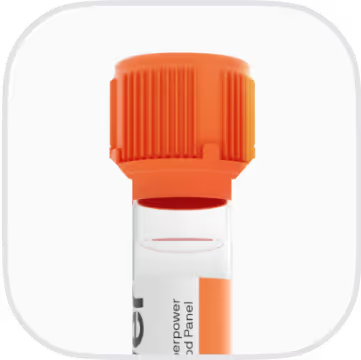What are Alzheimer’s Disease biomarkers
Alzheimer’s disease biomarkers are measurable molecules in blood that mirror the disease’s core brain changes, making the biology visible long before memory problems are obvious. They trace three linked processes: the buildup of sticky protein plaques (amyloid-beta; Aβ42/Aβ40), the misfolding and spread of a nerve cell scaffolding protein into tangles (phosphorylated tau; p-tau217, p-tau181), and the downstream injury and stress in brain cells and support cells (neurofilament light; NfL, and glial fibrillary acidic protein; GFAP). These markers originate in neurons and astrocytes, leak from brain to spinal fluid and into the bloodstream, and carry a chemical fingerprint of what is happening in the cortex and hippocampus. Blood testing for these biomarkers enables earlier, less invasive detection of Alzheimer’s biology, helps distinguish it from other causes of cognitive change, estimates how active the disease process is, and provides a way to monitor change over time and response to treatment. In short, they shift Alzheimer’s assessment from symptoms alone to direct measures of underlying pathology, bringing specialized brain insights into a simple blood draw.
Why is blood testing for Alzheimer’s Disease important?
- Screen reversible nutrient and vascular risks that affect memory and brain aging.
- Spot high homocysteine, linked to faster decline; lower with B vitamins and lifestyle.
- Clarify B12 status; deficiency can mimic dementia and is usually reversible.
- Clarify folate sufficiency; low folate can worsen memory and homocysteine.
- Guide safe supplementation—replace B12 or folate when low, avoid folate-only fixes.
- Flag unhealthy cholesterol and triglycerides that raise stroke and dementia risk; treat per cholesterol guidelines.
- Track progress by trending homocysteine and lipids to gauge treatment impact.
- Best interpreted with MMA, kidney function, thyroid, glucose, and your symptoms.
What insights will I get?
Alzheimer’s Disease blood testing provides insight into how your body’s metabolic and vascular systems support brain health and cognitive function. At Superpower, we focus on four key biomarkers: Homocysteine, B12, Folate, and Lipids. These markers help us understand the biochemical environment that influences memory, attention, and overall brain resilience.
Homocysteine is an amino acid produced during normal metabolism. Elevated levels can signal disruptions in methylation, a process essential for DNA repair and nerve cell function. High homocysteine is linked to increased risk of cognitive decline and Alzheimer’s Disease. Vitamin B12 and Folate are crucial nutrients that help keep homocysteine in check. Deficiencies in either can lead to higher homocysteine, impaired nerve signaling, and reduced brain protection. Lipids, which include cholesterol and triglycerides, reflect the health of your blood vessels. Imbalances in lipid levels can affect blood flow to the brain, influencing the risk of Alzheimer’s and other forms of dementia.
When these biomarkers are within healthy ranges, they support stable nerve cell function, efficient energy use in the brain, and robust vascular health. This integrated balance helps maintain memory, learning, and mental clarity as we age.
It’s important to note that results can be influenced by age, genetics, certain medications, acute illness, and laboratory methods. Interpretation should always consider these factors to provide an accurate picture of brain and systemic health.







.avif)



.svg)





.svg)


.svg)


.svg)

.avif)
.svg)










.avif)
.avif)
.avif)


.avif)
.avif)




.svg)




.avif)


